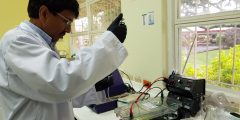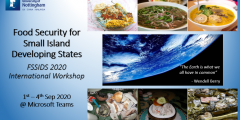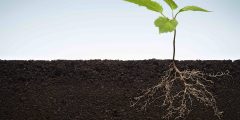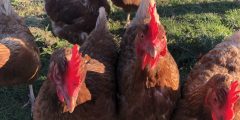Resistance to disease in tropical crops – an interview with Professor Pathmanathan Umaharan
September 17, 2020
Professor Pathmanathan Umaharan (‘Uma’) is the Director of the Cocoa Research Centre, University of the West Indies. The Future Food Beacon is proud to welcome him as an Honorary Professor for the 2020/21 academic year. We spoke with Uma about his research career, current projects, and collaborations with Future Food. Tell me about your work. What is your research about? …
Food Security in Small Island Developing States (FSSIDS) – a conference report by Dr. Chung Hong Tan
September 11, 2020
In the first week of September 2020, the Future Food Beacons at the University of Nottingham’s UK and Malaysia campuses jointly ran an international workshop Food Security in Small Island Developing States (FSSIDS 2020). The workshop brought together more than 30 participants from 10 countries in Southeast Asia and the Pacific, in addition to …
Blue copper in Casparian strips: the work of Dr Guilhem Reyt
September 4, 2020
Dr Guilhem Reyt is a Research Fellow working with the Future Food Beacon. This brief blog provides links to recent coverage of his work and, most importantly, to his new paper in Current Biology. Locked out during lockdown Any scientist who was locked out of their laboratory during the Covid-19 pandemic of 2020 will be …
Greenhouse gas emissions from sunflower oil production – by Thomas Alcock
August 19, 2020
Vegetable oil production around the world Today, global food systems are responsible for 26% of all of the world’s greenhouse gas (GHG) emissions. Crops grown for vegetable oil and their co-products, such as animal feed, account for 19% of non-pasture, cropped land. They therefore represent a major source of GHG emissions, which are only set …
Understanding plant microbe interactions
July 29, 2020
Dr Gabriel Castrillo is a Nottingham Research Fellow whose research focuses on the definition of the molecular mechanisms of plant-microbe interactions. He has won funding from The Leverhulme Trust, the Royal Society and recently, a joint award from the BBSRC (UK) and the National Science Foundation (US) in collaboration with colleagues from the University of …
Transforming chicken feed for the future: an interview with Hannah Dallas
July 8, 2020
Hannah Dallas is a PhD candidate with the Future Proteins Platform. Her project is titled The application of methanotroph bacteria Methylococcus capsulatus as chicken feed. Hannah is supervised by: Dr Ying Zhang, Prof Michael Lee, and Tithira Wimalasenaf. Prior to joining UoN, Hannah completed a Masters in Medicinal and Pharmaceutical Chemistry at the University of …
Understanding genetic variation in winged bean: an interview with Niki Tsoutsoura
July 1, 2020
Niki is a PhD candidate with the Future Proteins Platform. Niki holds an MSc. in Crop Improvement from the University of Nottingham. During her MSc studies, she became familiar with underutilised crops like winged bean. Underutilised crops are relatively underexploited as they have low economic importance or agricultural significance in developed economies, therefore they receive …
Reducing protein malnourishment: an interview with Joe Godrich
Joe Godrich is a PhD candidate with the Future Proteins Platform. Joe’s project is titled: Natural protein ingredients – the impacts of reduced refinement. Joe is supervised by Dr Jo Gould, Prof Tim Foster, and Dr Peter Rose. The project investigates the structure-function relationship of protein produced without high refinement. Prior to joining the Future …
Making sense of food waste: an interview with Hina Kamal
Hina Kamal is a PhD candidate with the Future Proteins project. Hina’s project is titled Food recycling: Utilising food waste for valuable proteins. Her supervisors are Prof Asgar Ali, Dr Le Cheng Fohm, and Dr Tim Parr. Hina’s research is focused on food waste recycling, in the context of understanding protein extraction methods, protein yield …











Recent Comments